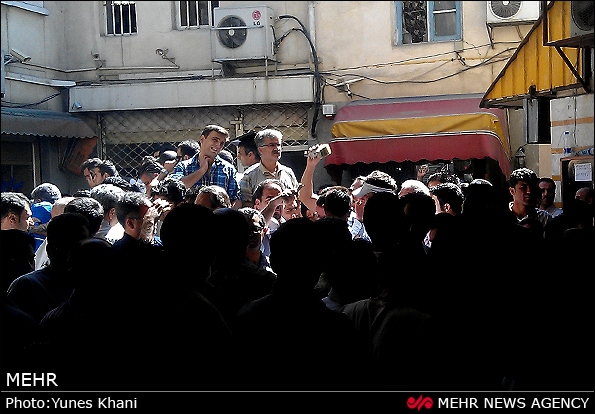Iran Feature: A Beginner's Guide to the Currency Crisis (Paivar)
Currency trade in Tehran on Tuesday
See also Iran Snap Analysis: Ahmadinejad and The Economy's "Worthless Pieces of Paper"
Amir Paivar, the Business Correspondent of BBC Persian, writes:
As international sanctions against Iran have tightened, the value of the Iranian currency has plummeted.
Ferdowsi Street in central Tehran is named after Ferdowsi, a poet who millennia ago compiled the Epic of Persian Kings and their eternal, mythical battle with evil.
The road is home to a long row of small shops where three types of money traders operate: "illegal" street money-changers, licensed exchange bureaux and, last but by no means least, big traders who move and shake the market with a phone call from their drab offices in the back alleys.
Street money-changers walk up and down the pavement shouting or whispering (depending on how much the government likes them at the time) the words "dollar, pound, euro". They offer good deals for small transactions, turning a few notes into rial for tourists or locals.
The exchange bureaux are licensed and monitored by Iran's central bank and handle bigger transactions. They are normally caught between a central bank that sometimes dictates exchange rates, and a market that works on more acceptable, basic rules of supply and demand.
The kingmakers, though, are the big traders of the back alleys, "the invisible mafia" as the government prefers to brand them, those who are blamed for everything that goes wrong with Iran's currency market.
In the recent crisis this so-called mafia is accused of scooping dollars out of the market in a move challenging government measures to contain the crisis.
***
On Monday of last week, Iran's central bank opened a new foreign exchange centre to supply importers with a rate originally planned at 2% lower than that of the market.
The state-affiliated centre failed to respond to demand and, at the same time, hard currency normally pumped into the market by the central bank dried up, triggering fresh panic.
In the past seven days, Iran's rial has has lost 25% of its value; it is now, at best, worth only a quarter of what it was 18 months ago. And the freefall seems to have no end in sight.
Recent days in Iran have seen runs on foreign currencies and on gold - assets that are easily liquefied in the domestic market or transferable overseas.
On the one hand Iranians have lost their trust in their government's grip over the economy, and on the other they fear their country may end up in a military confrontation with Israel over its nuclear programme.
Therefore, they have good reason to change whatever they have in hand into currencies whose value is sustained internationally, or into gold bullion which they can throw into a suitcase if they want to hop aboard a flight and leave the country.
On Tuesday morning the window of licensed exchange bureaux showed rates never seen before: every US dollar bought 35,000 rials; currently the lowest valued currency per unit in the world.
***
To try to prevent such excessive weakening of the rial, Iran's central bank has long been implementing a "managed float" of the currency. The backbone of the policy is to inject enough petrodollars into the market to keep the rial's value against the dollar high.
But then came the sanctions.

 Wednesday, October 3, 2012 at 8:03
Wednesday, October 3, 2012 at 8:03
Reader Comments